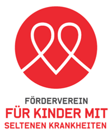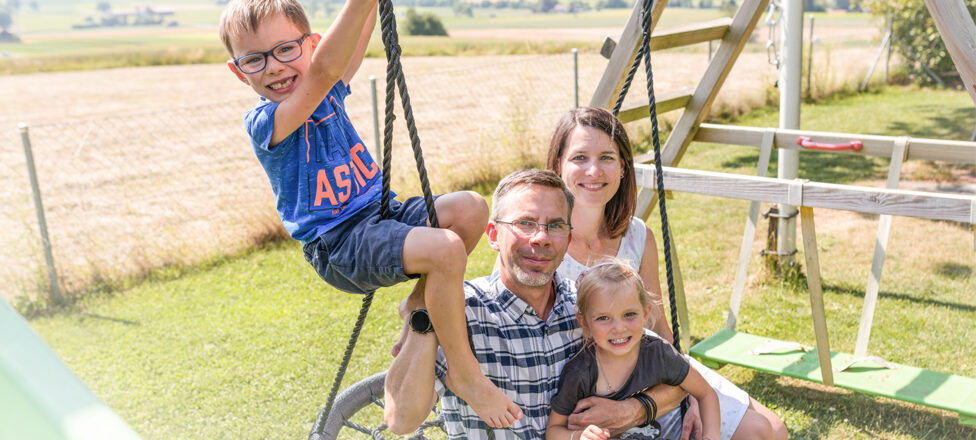For children with rare diseases, the family plays a central role.
Even if roles, tasks and functions differ within a family, mutual support is central and must be seen as a very important resource for coping with the situation. Support from one's own family as well as other important caregivers ensures that difficult situations can often be managed over a long period of time. It is important to accept help and to refuel energy again and again in between - for oneself, the partnership, the children or also for reference persons. If you only give and never refuel, you will burn out.
Important notes
Note 1: Watch your resources and get "rest breaks"
A scheduling tool (e.g. Doodle) can be helpful here to plan care times with the environment and professional relief offers (e.g. relief service).
The following questions can help you become aware of your own needs:
- What is good for me?
- What is the daily routine and how can time slots be created or used?
- How can I incorporate relaxing moments into my daily routine?
- Who from my environment or my family can support me and how?
Note 2: Also pay attention to your needs
It is easy to understand that one's own needs are Needs get lost in the everyday worries. Therefore, every now and then, consciously take a short break and ask yourself:
- How am I doing?
- What are my Needs?
- What do I need to cope with the situation?
Family
Planning or external support can be a way to create time out for yourself
time out for yourself. Don't put your needs on the back burner or make yourself feel guilty.
Note 3: Get help sooner rather than later
The Being a mother or father of a child with a rare disease can confront you with challenges that also put a strain on your partnership.
Couples can grow stronger together through such a crisis situation.
If
you are not pulling in the same direction, or if a couple grows apart because of
if you don't pull together, or if a couple drifts apart because of worry, it can break the partnership. Get
get support early on - the sooner, the better.
Note 4: Siblings appreciate the truth
Siblings need information. Talk openly with the siblings about the disease, of course, appropriate to the Appropriate to their stage of development.
It is easier for siblings if they are told the truth than if they are
siblings are told the truth than if they are presented with an ideal world and still
but they still sense that something is wrong.
Note 5: Create sickness-free spaces for siblings
Worried about the little patient, the availability of the patient, the parents' availability and attention are limited to the healthy siblings Parents to the healthy siblings.
Make time specifically for healthy siblings Siblings (e.g. through a respite service). Be it even just to Play at home or, if possible, for an outing together. In addition there are associations and foundations that specifically offer time out for siblings offer.
Important questions
What points of contact are there for parents when challenges arise in the couple relationship?
Relief through (psychological) support
Familyblues.ch
Interesting links
insieme Switzerland
The psychological counseling and accompaniment of insieme is directed is aimed at all people with special needs and/or their relatives who find themselves find themselves in a challenging or stressful life situation. Topics: Relationship and love, sexuality, childhood, puberty, old age, grief, Death, behavioral problems, conflicts with authorities and institutions, etc. Psychological counseling is confidential and free of charge. There membership in insieme is not required.
Interesting links
Child and youth welfare/family counseling
A separation or divorce can ease a situation, but it can also bring challenges of various kinds. Children's and Youth Welfare/Family Counseling offers, among other things, counseling around separation and divorce - not only for the children themselves, but also for the adults Adults. In addition, information and support is also provided for single parents single parents. You will also find a lot of information on how you can best support your child in this situation. If you are interested inform yourself about the appropriate contact point in your canton.
Couples therapy
Many psychologists offer couples therapy. Ask those around you or search the Internet for a couples therapist who meets your needs Therapist who meets your needs. A few examples can be found in the following list of links:
Pro Juventute
Pro Juventute offers parents of children with and without special needs information tips for everyday family life and points of contact for questions and problems.
Interesting links
Divorce Counseling
The public couples counseling centers in various cantons also offer Services in the field of ambivalence counseling, separation counseling, mediation, Conflict management, divorce counseling and post-divorce mediation.
Interesting links
Swiss professional association for maternal and paternal counseling
Maternal and paternal counseling offers free counseling for families at their place of residence. The counseling does not specifically refer to the topics "special needs" and "disability", but helps parents to find their way in their role and gives professional advice on topics such as health, development, nutrition or education of children.
Interesting links
Which contact points and offers are there for siblings?
Living with siblings with special needs can be very enriching. However, healthy siblings also face many challenges on a daily basis numerous challenges on a daily basis. For example, the sick child is often the focus of attention and parental availability is limited for the healthy sibling, they often have to be considerate of the sick sibling or they face stigmatization from the environment confronted with stigmatization from the environment.
Your turn
The competence center "It's your turn" is committed to ensuring that siblings can grow up healthy. The various Offers and events can be found on the website.
Interesting links
siblings-children.ch
Siblings - among us
The exchange platform for siblings of children with rare diseases Is an offer for all siblings who are over 16 years old are
Interesting links
KiDS-22q11
Interesting Links
Children's afternoons of the Cancer League (ZH)
The Cancer League Zurich offers afternoons for schoolchildren up to 12 years of age who encounter the topic of cancer in their encounter.
Interesting links
Child psychologists
If a sibling is suffering situation, it may be helpful to consult a child psychologist or a child psychologist.
Interesting links
Life With
"life with" is an offer especially for siblings who have lost their brother or sister. Group meetings and digital meetings are offered here.
Interesting Links
Other points of contact
Interesting technical articles from the KMSK knowledge books "Rare Diseases
2. KMSK Knowledge Book "Rare Diseases - The Way - Genetics , Everyday Life, Family and Life Planning"
Dominik
Schöbi, Department of Psychology, Faculty of Philosophy, University of
Fribourg: "Men deal with stress differently than women"
Michèle Widler, Psychotherapist, Competence Center Pediatric Palliative Care, University Children's Hospital Zurich: "Siblings often have strong social skills"
4. KMSK Knowledge Book "Rare Diseases - Psychosocial Challenges for Parents and Siblings"
Elsbeth van Dam, grandmother of Lio: "I am immensely proud of my daughter and grandson"
Gabriela Oertli, Couple and Family Therapist, CANARIO Practice for Music Therapy and Family Counseling: "Challenges in the couple relationship"
Sara Fischer, psychotherapist and specialist psychologist: "Clarification helps to create understanding"
Friedrich Dieter Hinze, psychologist, trainer, coach, Author and consultant: "Fathers are more emotional than their objectivity suggests"
Beatrice Bucher, counseling SGfB, psychosocial counseling in Uster : "A separation or divorce always hurts. To the parents, to the children, whether healthy or sick."
Jasmine Mayr, Kinderspitex Ostschweiz: How mothers affected mothers can draw new strength
5. KMSK Knowledge Book "Rare Diseases - Digital Knowledge Platform for Parents and Professionals"
Robin Mindell, Playtime Physiotherapy Zurich:
Impairment, like health, must be allowed a place in every life
Doris Thomann, grandmother: Looking into the future worries me as a mother and grandmother
Prof. Dr. Silke Wiegand-Grefe, MSH Medical School Hamburg: Take help and support!

